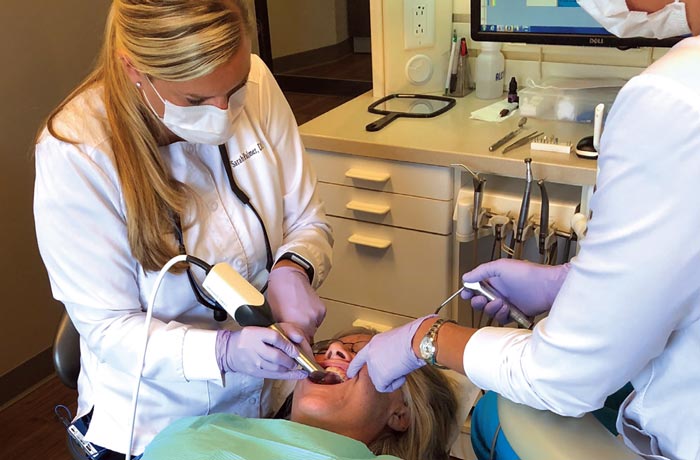Find the very best Dentist in Eugene Oregon for Your Household's Dental Demands
Find the very best Dentist in Eugene Oregon for Your Household's Dental Demands
Blog Article
A Guide to Typical Dental Conditions That Need a Dentist's Care
Comprehending the variety of dental conditions that require expert care is vital for maintaining ideal dental wellness. Toothaches, for example, can be symptomatic of serious concerns such as cavities, broken teeth, or abscesses, each requiring specific interventions like fillings or root canals. Periodontal condition, from the onset of gingivitis to a lot more serious periodontitis, highlights the relevance of normal oral check-ups and cleanings. Furthermore, affected wisdom teeth and jaw disorders can introduce substantial discomfort and issues. Ensuring timely brows through to the dental professional can reduce these issues effectively, however just what are the treatments and signs included?
Toothaches
Toothaches are a typical dental problem that can vary from moderate pain to extreme discomfort, typically indicating an underlying concern that requires professional focus. This pain can come from a selection of sources, including oral tooth cavities, split or fractured teeth, and dental abscesses. Each of these conditions poses substantial dangers if left neglected, possibly bring about a lot more severe difficulties.
Oral tooth cavities, also known as decays, are triggered by the buildup of plaque that erodes tooth enamel, leading to openings or pits in the impacted teeth. Abscesses are uncomfortable infections at the root of a tooth or in between a tooth and the gum, typically resulting from extreme decay or untreated dental caries.
Reliable treatment of toothaches entails attending to the source. This might consist of fillings for cavities, crowns for split teeth, or root canals and antibiotics for abscesses. Early treatment by a dental professional can protect against further damage and ease pain, ensuring ideal oral wellness.
Gum Tissue Disease
Periodontal disease, a common yet often neglected oral condition, manifests with inflammation and infection of the gum tissues and sustaining cells. If left untreated, gingivitis can proceed to periodontitis, a much more extreme type defined by the destruction of the sustaining bone and connective tissue, eventually leading to tooth loss.
The key reason for periodontal illness is bacterial plaque, a sticky, anemic movie that regularly creates on teeth. Poor dental hygiene, cigarette smoking, genetic tendency, and particular clinical problems, such as diabetes mellitus, can exacerbate the risk of developing gum tissue disease. Regular oral exams are vital for early discovery and monitoring of this condition.
Treatment for gum disease varies from specialist dental cleaning and scaling to advanced treatments like root planing and periodontal surgical treatment, relying on the seriousness. Preserving good dental health methods, including brushing two times daily, flossing, and using a disinfectant mouthwash, can considerably reduce the threat of gum tissue illness and promote healthier gums.
Tooth Cavities
Tooth cavities, additionally understood as tooth decays, are a common oral condition identified by the destruction of tooth enamel as a result of acid-producing bacteria in the mouth. These bacteria prosper on sugars and starches from food and drinks, creating acids that progressively erode the enamel, resulting in cavity formation.
Early-stage cavities might disappoint signs and symptoms, but as they progress, they can trigger tooth pain, sensitivity to hot or chilly, visible holes or pits in the teeth, and staining. If left unattended, cavities can penetrate much deeper layers of the tooth, possibly leading to extreme discomfort, infection, and even tooth loss.
Avoiding cavities involves a combination of great click oral health practices and nutritional routines. Website Regular brushing with fluoride tooth paste, flossing, and routine dental check-ups are important. Dental experts might also advise added preventive measures, such as fluoride therapies and dental sealers, to protect teeth from decay.
Therapy for dental caries relies on their intensity. Small tooth cavities can be resolved with oral fillings, which recover the tooth's framework. If the degeneration has actually gotten to the tooth's pulp, more sophisticated cases may require crowns or also root canal therapy. Prompt intervention by a dental expert is necessary to avoid problems and preserve general dental health and wellness.

Impacted Knowledge Teeth
Impacted knowledge teeth are a widespread dental concern that takes place when the 3rd molars, typically described as knowledge teeth, stop working to fully emerge or straighten properly within the mouth. This condition frequently arises from not enough space in the jaw or an unusual development angle of the teeth. Influenced wisdom teeth can result in a variety of difficulties, including i was reading this infection, pain, and damage to nearby teeth.
When knowledge teeth end up being affected, they are often partially erupted or continue to be entirely beneath the periodontal line. This partial eruption can create a path for microorganisms to get in the gums, bring about infections that materialize as swelling, discomfort, and also fever. Additionally, affected knowledge teeth can put in pressure on bordering teeth, possibly triggering crowding or moving.
A comprehensive oral exam, typically involving X-rays, is vital for diagnosing impacted knowledge teeth. Therapy usually involves surgical removal, performed by a dental surgeon. The treatment intends to minimize pain and avoid further difficulties, such as cysts or damages to bordering bone structures. Post-operative care is critical to guarantee appropriate healing and decrease the danger of infection. Normal dental exams are a good idea to keep track of the condition and keep oral wellness.
Jaw Disorders
Jaw problems, collectively known as temporomandibular joint (TMJ) conditions, incorporate a variety of problems that impact the jaw joint and bordering muscles. These conditions can manifest via signs such as discomfort or tenderness in the jaw, trouble chewing, a clicking or popping noise when opening or shutting the mouth, and also persistent migraines. TMJ problems can occur from numerous aspects, consisting of arthritis, jaw injury, or habitual behaviors like teeth grinding or jaw clenching.
Medical diagnosis of TMJ conditions generally includes a thorough analysis by a dental professional, including a physical assessment of the jaw, oral X-rays, and occasionally progressed imaging methods like MRI or CT checks to examine the joint's condition. Non-invasive strategies such as physical treatment, oral splints, and medicines aimed at minimizing inflammation and discomfort are frequently first-line treatments.
Early intervention by a dental specialist is essential to avoid the progression of TMJ disorders and to preserve overall dental health. People experiencing relentless jaw pain or dysfunction need to look for prompt assessment and treatment.
Verdict
Preserving dental wellness demands prompt professional like address common oral problems. Toothaches commonly show underlying concerns such as dental caries, fractured teeth, or abscesses, needing prompt intervention. Gum condition, from gingivitis to periodontitis, needs routine dental exams and cleanings to avoid progression. Affected wisdom teeth and jaw problems likewise call for professional focus to relieve discomfort and avoid additional complications. Routine dental sees are essential for detecting and dealing with these problems, ensuring total oral health and wellness and health.
Oral tooth cavities, likewise understood as decays, are caused by the buildup of plaque that wears down tooth enamel, leading to holes or pits in the affected teeth. Abscesses are uncomfortable infections at the root of a tooth or between the gum and a tooth, generally resulting from extreme decay or untreated dental caries.

Additionally, impacted knowledge teeth can exert pressure on neighboring teeth, possibly triggering crowding or moving.
Report this page